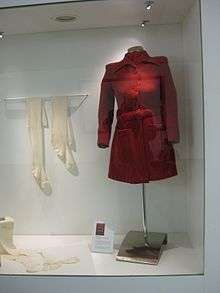Utility clothing

Red coat and stockings at Bury Art Museum
The Utility Clothing Scheme was a rationing scheme introduced in the United Kingdom by the British government during World War II. In response to the shortage of clothing materials and labour due to the requirements of the war effort, the Board of Trade sponsored the creation of ranges of "utility clothing" meeting tight specifications regarding the amount of material and labour allowed to be used in their construction. Utility clothing, and later utility furniture, was marked with the CC41 mark.[1]

CC41 label on a coat
In spite of its austere specification, utility clothing designs were commissioned from leading fashion designers including Hardy Amies, Norman Hartnell and other members of the Incorporated Society of London Fashion Designers.[2]

A wartime shop window displaying utility clothing designed by Norman Hartnell
See also
- CC41
- Limitation of Supplies (Cloth and Apparel) Order 1941
- Utility Cloth (Maximum Price) Order
- Utility Clothing (Maximum Prices and Charges) Order
References
- ↑ "1940s Fashion - Utility scheme". Hull City Council. Retrieved 2012-01-01.
- ↑ Robert Daoust (18 Feb 2010). "Fashion or ration: Hartnell, Amies and dressing for the Blitz". The National Archives.
This article is issued from Wikipedia - version of the 11/21/2016. The text is available under the Creative Commons Attribution/Share Alike but additional terms may apply for the media files.